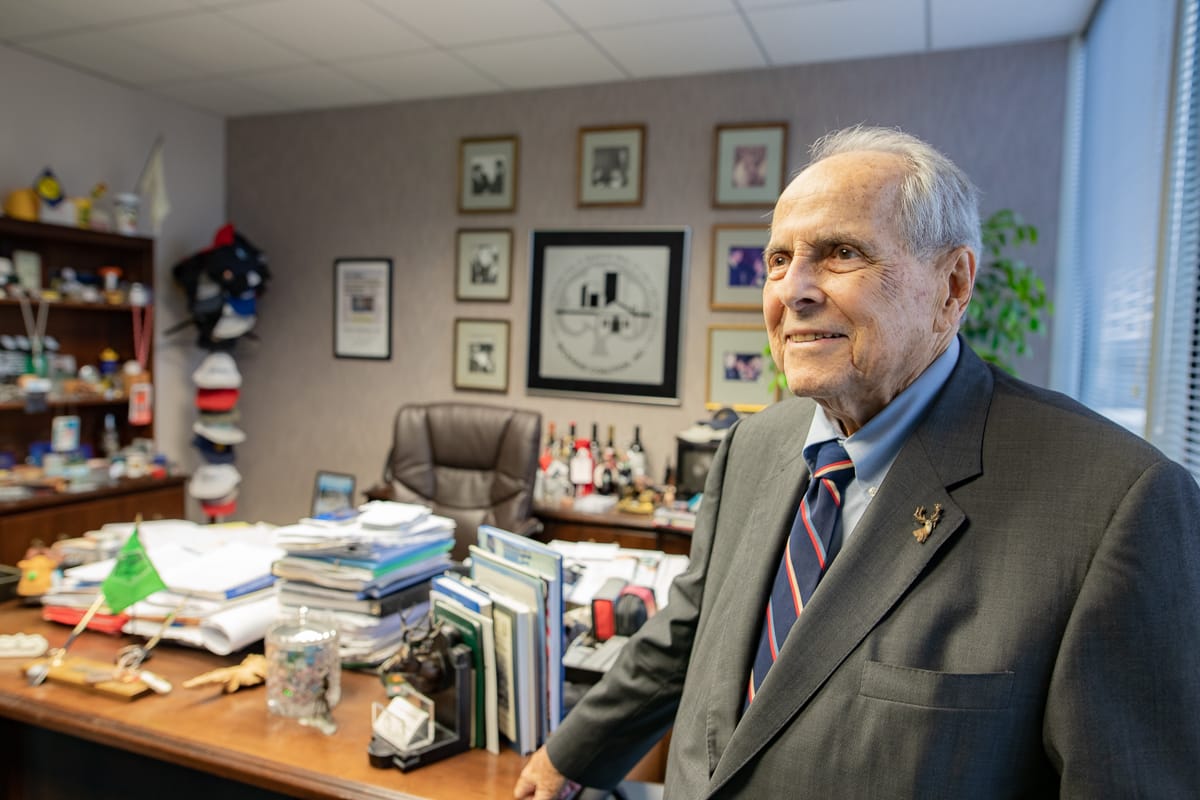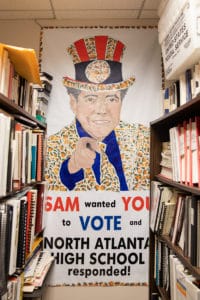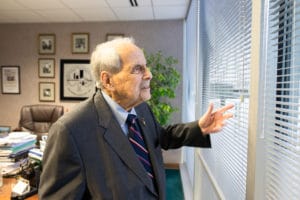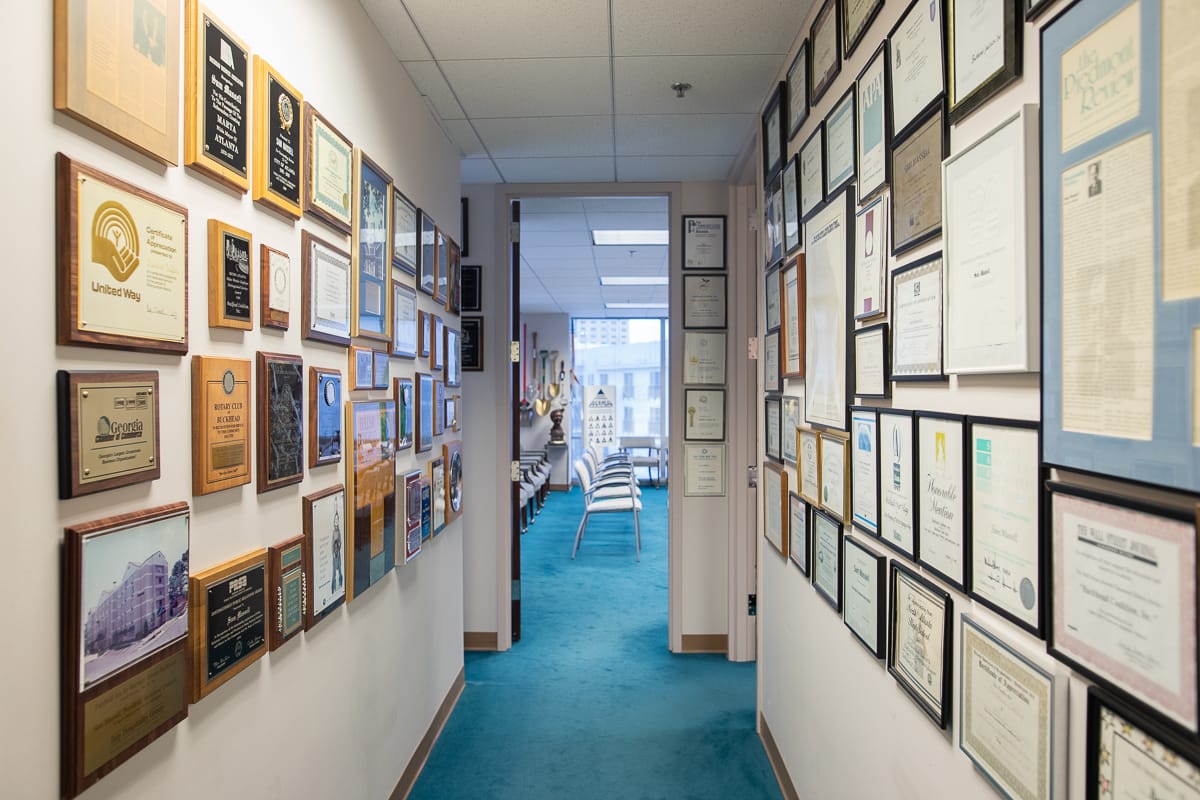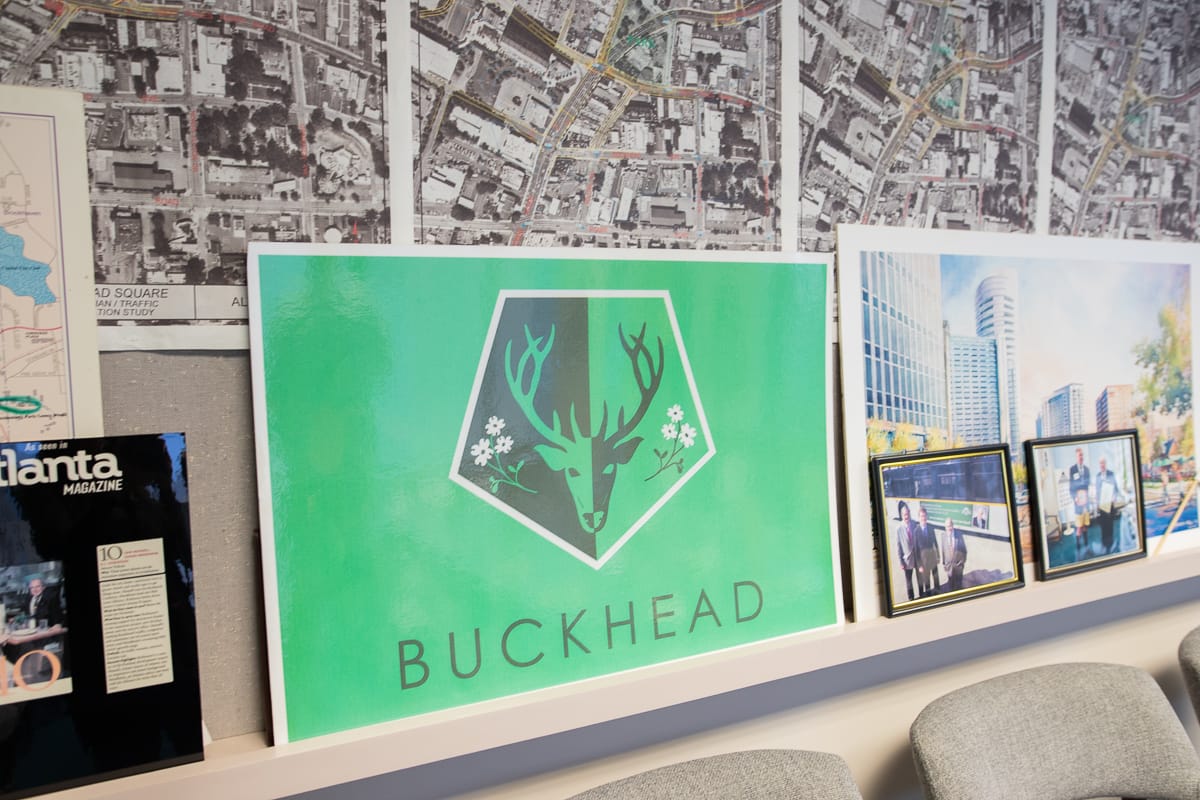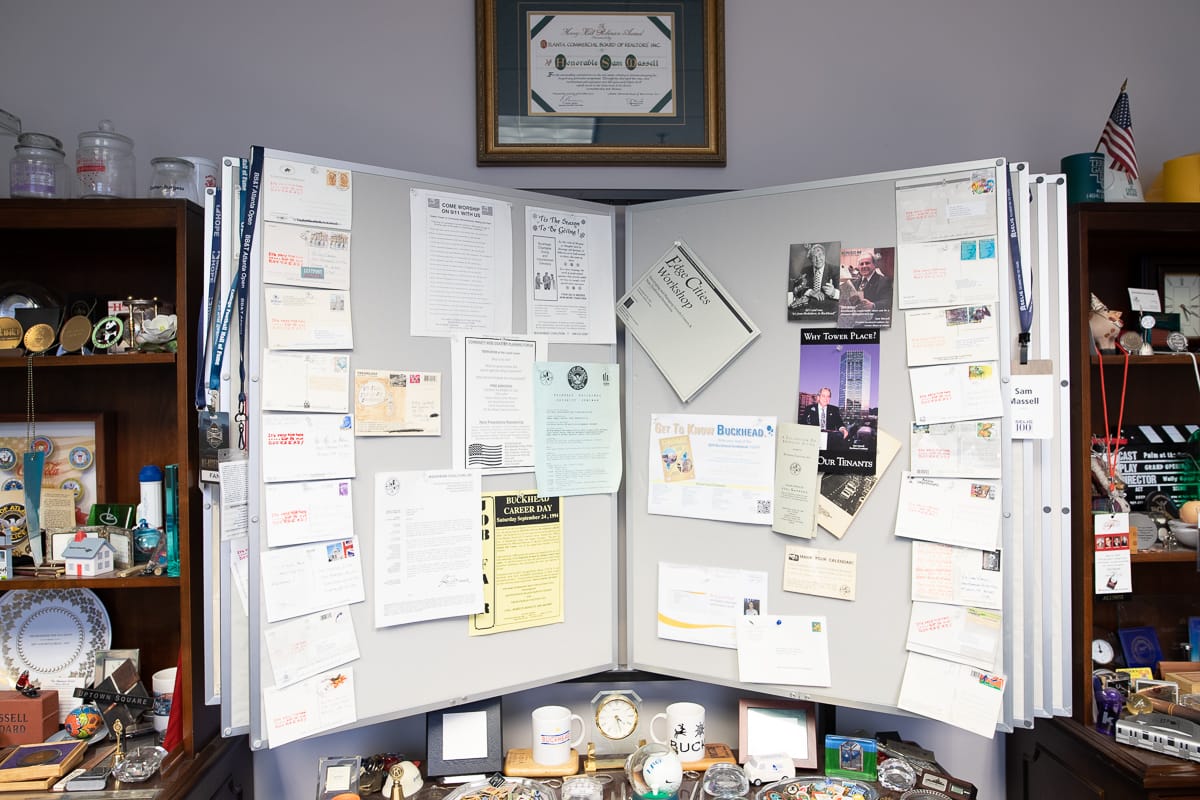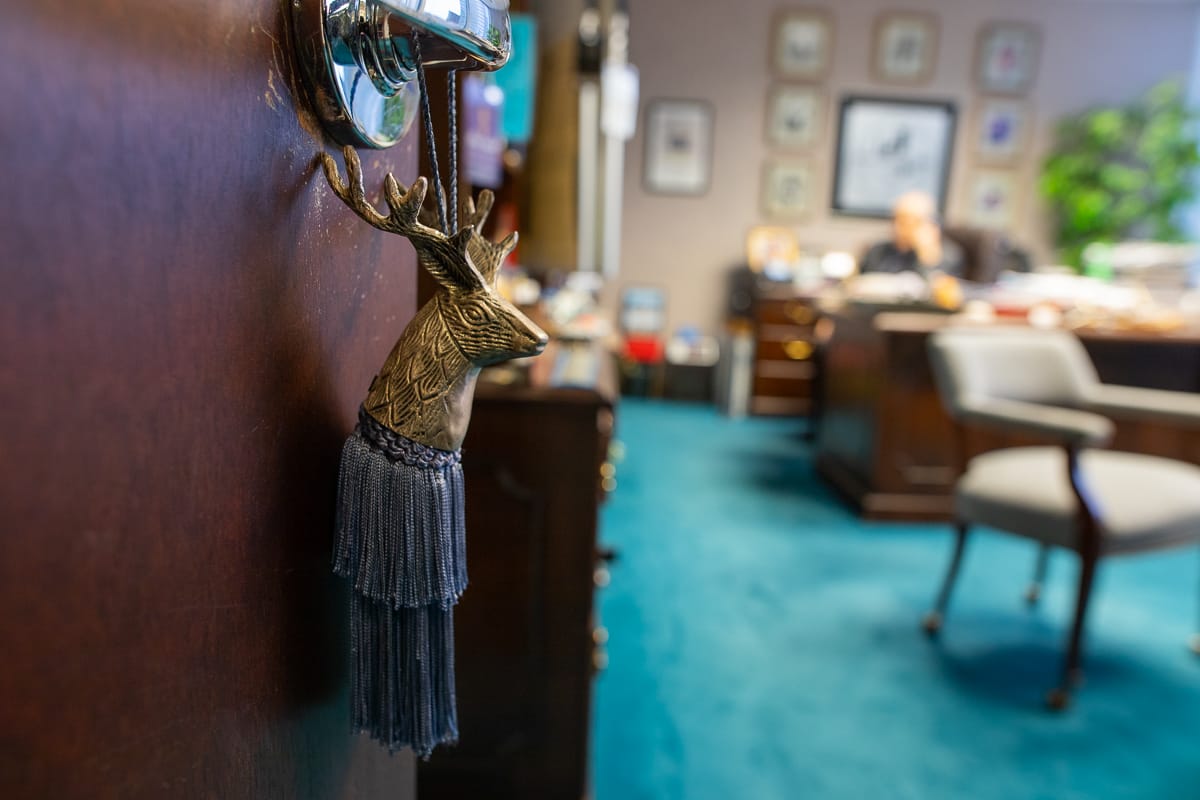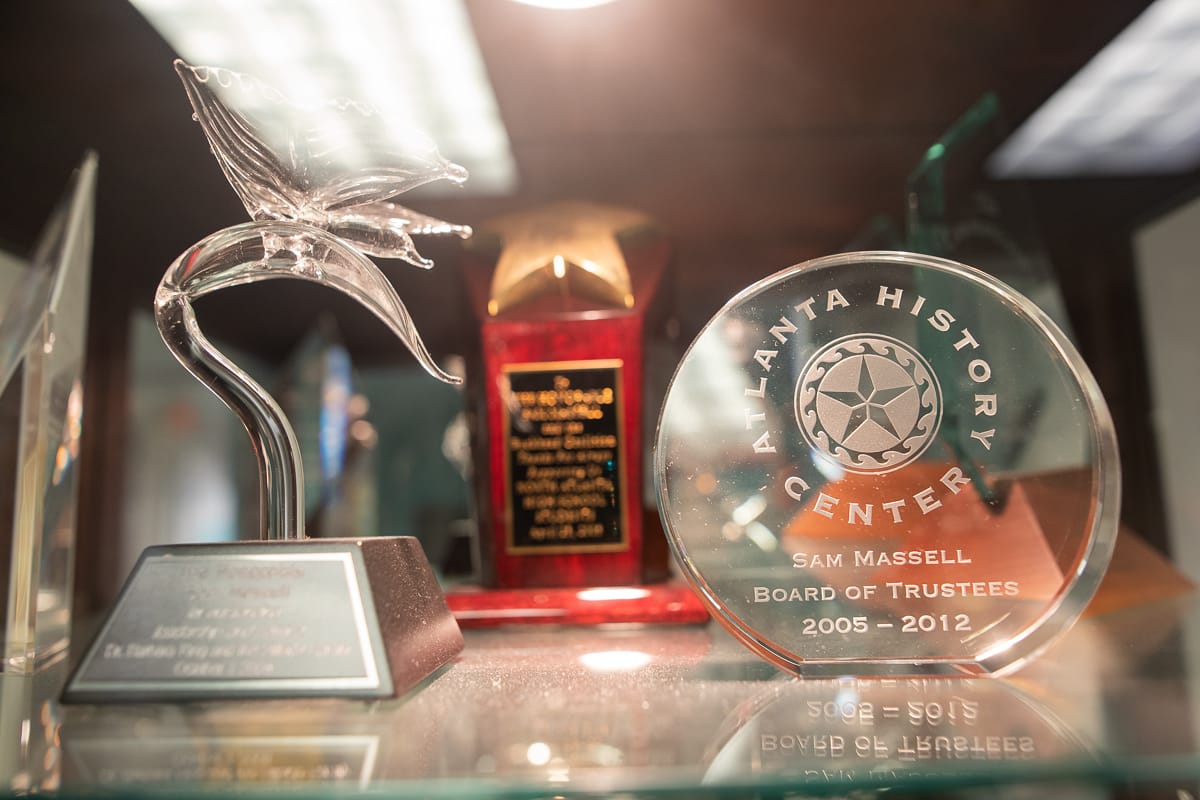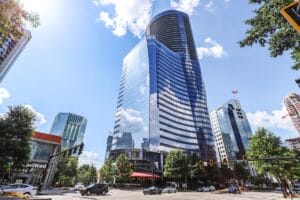After a lifetime of civic engagement and leadership roles, including a stint as the 53rd mayor of Atlanta, Sam Massell has recently announced his retirement from the Buckhead Coalition at the age of 92. Since 1989 the civic nonprofit organization has been dedicated to nurturing and preserving the quality of life for those who work, live, and play in Buckhead.
“I’ve got I think four or five months before I’ll be completely out, so I’m still coming back daily. In fact I’ve got what might be called ‘seller’s remorse’ now,” said Massell with a laugh, “because I’m perfectly happy coming in here and working. I enjoyed it then and I enjoy it now.” Beyond training his replacement, he intends to be available in a consulting capacity to the Coalition for years to come.
Massell, a lifelong Atlantan, has had a remarkable career. As a young man Massell was drafted into the United States Army Air Forces in 1946 while still an Emory University student. After his military service he returned and completed his Bachelor’s degree in Commercial Science in 1951 at the Atlanta Division of the University of Georgia. The following year he launched his career as a real estate agent.
Million Dollar Club
For two decades Massell found success in real estate, eventually becoming vice president of one of Atlanta’s largest commercial brokerage firms at the time: the Allan-Grayson Realty Company. He was also honored as a charter member of the “Million Dollar Club” of the Atlanta Real Estate Board, a designation which is now in its 62nd year.
Before long Massell’s achievements as a businessman led him to becoming active in politics, holding positions such as city councilman for Mountain Park, serving on the Atlanta City Executive Committee, and President of Atlanta’s Board of Alderman now known as the City Council. Upon his election to mayor in a runoff election in 1970 he eagerly took to the role. One of his proudest achievements as mayor was championing the Metropolitan Atlanta Rapid Transit Authority (MARTA), and thereafter using his clout to insist that the extension of GA400 include train lines down the middle of the new interstate, connecting Buckhead not just to northern communities like Roswell, but also to the airport and “the rest of the world.”
“I felt mobility is man’s fifth freedom, without that they are imprisoned in their neighborhood. Without that they can’t go to work, they can’t go to shops, they can’t go to parks, it’s just an entirely different lifestyle if they don’t have mobility,” explained Massell, who indicated that he thinks MARTA will continue to expand. “It’s extremely important to Atlanta and its wellbeing, and it’s not an easy task but little by little we progressed and expanded. It shall continue, I’m certain, in the years ahead.”
As mayor, Massell is also credited for establishing the Omni Coliseum and Woodruff Park in Central City all achieved without raising ad valorem taxes. He was the president of the National League of Cities which was composed of 15,000 council members and mayors from across the country and he also sat on the Atlanta Committee for the Olympic Games. Massell is considered a pioneer for his efforts to promote minorities in government; during his time as mayor he appointed the first woman to the Atlanta City Council as well as the first African American municipal department heads.
Buckhead Coalition
When Massell founded the Buckhead Coalition in 1989 – inspired by the suggestion of his friend Charlie Loudermilk who was at the time the CEO of Aaron’s – the plan was to help establish Buckhead. “Similar to today, [we focused on] branding the community, defining the community. We had to really start from scratch creating boundaries that we got adopted officially by the Georgia House of Representatives, creating even a flag and a song and making it like a township.” The skyline that only consisted of about 10 skyscrapers has since bloomed into a bustling metropolitan center with around 60 major buildings.
Today, the 28 square miles that comprise Buckhead and encompass 40 neighborhoods are home to about 100,000 residents, a far cry from those humble early beginnings. The Buckhead Coalition, a nonprofit not involved with partisan politics or holding any official power handed down by the government, has played a unique role in that incredible growth. Funded by member dues, led by only 3.5 staff members, and with a membership limited to 100 CEOs, the organization has managed to present around 36 new initiatives every year since its inception.
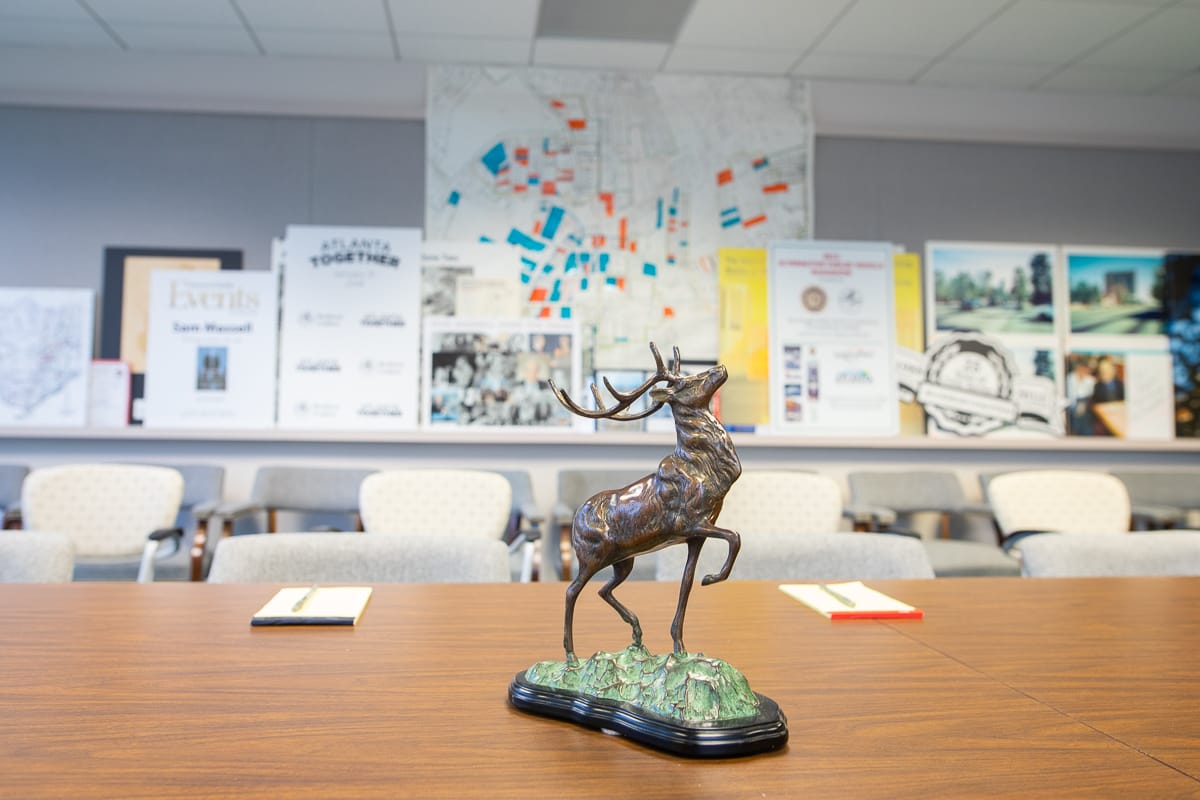
By working with the community the Buckhead Coalition has been able to enact large-scale achievements such as filling around 80 potholes in the course of just one weekend, handing out trauma kits to police departments, issuing rewards for solving crimes, and distributing life-saving devices such as defibrillators to local churches, hotels, and retail centers long before they became commonplace. Recently the Coalition opted to provide face masks to anyone with a Buckhead address who requested them at the onset of the Covid-19 pandemic.
“We have gotten along with those that have the power and those who do the down and dirty, who walk the walk. We talk the talk and we try to work with everybody,” said Massell, explaining that these achievements were only possible by working jointly with the private sector and the government towards common goals.
Should Buckhead Become a City?
One question that Massell says he loves to answer is sometimes considered somewhat taboo or controversial: should Buckhead become a city? And to that his answer is a resounding “no.” Massell explained that while Buckhead is the “address of choice” and is obviously where he has focused most of his efforts in recent years, it is ultimately a crucial part of Atlanta. “Whereas it might be a short term benefit to the residents in Buckhead, it certainly won’t be meaningful in a positive way to the city as a whole,” said Massell. “The truth of the matter is if you took away Buckhead from Atlanta, you’ve taken 20% of the population, about 20% of the land area, but you’ve taken 45% of the taxes,” and he feels that those problems in underprivileged areas would simply compound upon themselves and negatively impact the city as a whole. “So from a humane standpoint if nothing else we shouldn’t think of it,” he continued. Not only that, he tends to see more government as a bad thing, so he is opposed to the idea of having a separate police force, public works department, school department, and so forth. “Proliferation of bureaucracy is not a healthy thing.”
According to Massell, he hopes the future for Buckhead holds more of the same. He suggests that we should concern ourselves with reducing crime, keeping taxes low, and improving our traffic congestion. In addition to providing more reasonably-priced housing, he also hopes the future holds more opportunities for affordable business ventures to flourish in the community. He has suggested one possible solution: that banks with unused space would open their doors to local mom-and-pop operations so they could have an official address and office space within the community. In Massell’s eyes, it is through a combination of a strong nonprofit sector, thriving retail and commercial industry, and media that continues to share these organizations’ achievements that the community will continue to grow.
Massell’s Legacy
As for his legacy, Massell doesn’t ask for much. Yes, his office at Tower Place Plaza in the heart of Buckhead is stacked to the brim with awards and recognition for his achievements. Yes, his autobiography Play It Again, Sam has been well-received and he understands that he is looked to as a leader in the community. But he is also still quite humble.
His one lingering wish, something he had hoped to achieve before retiring, has been to found a hub for nonprofit organizations similar to the one his uncle Ben Massell ran near the Hurt building back in the 40s and 50s. The center operated under an agreement that participating nonprofits would only pay taxes and benefit from a rent-free space in which to perform their essential functions. Though he adamantly decries government institutions being named after still-living leaders, he acquiesced that an unaffiliated center such as this would be a lovely legacy to leave for the next generation.
So if you’re reading this and feeling inspired, might we recommend Buckhead’s next ambitious undertaking: the Sam Massell Center for Nonprofits.

